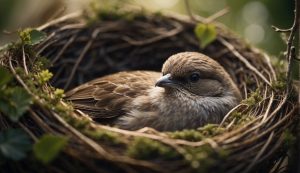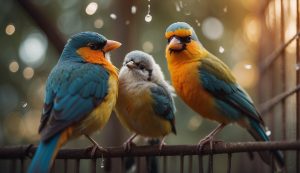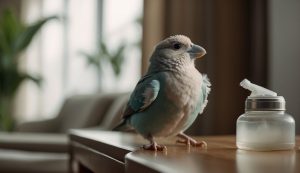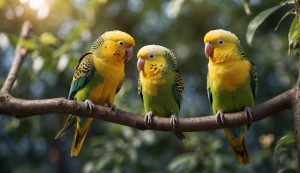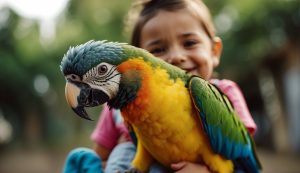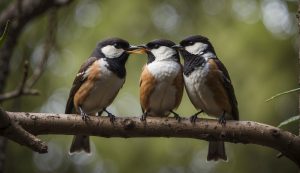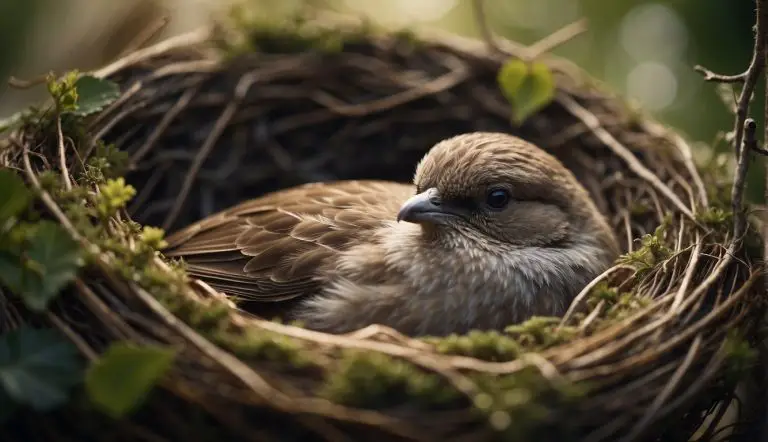Why Do My Pet Birds Keep Dying? – Uncovering Common Causes
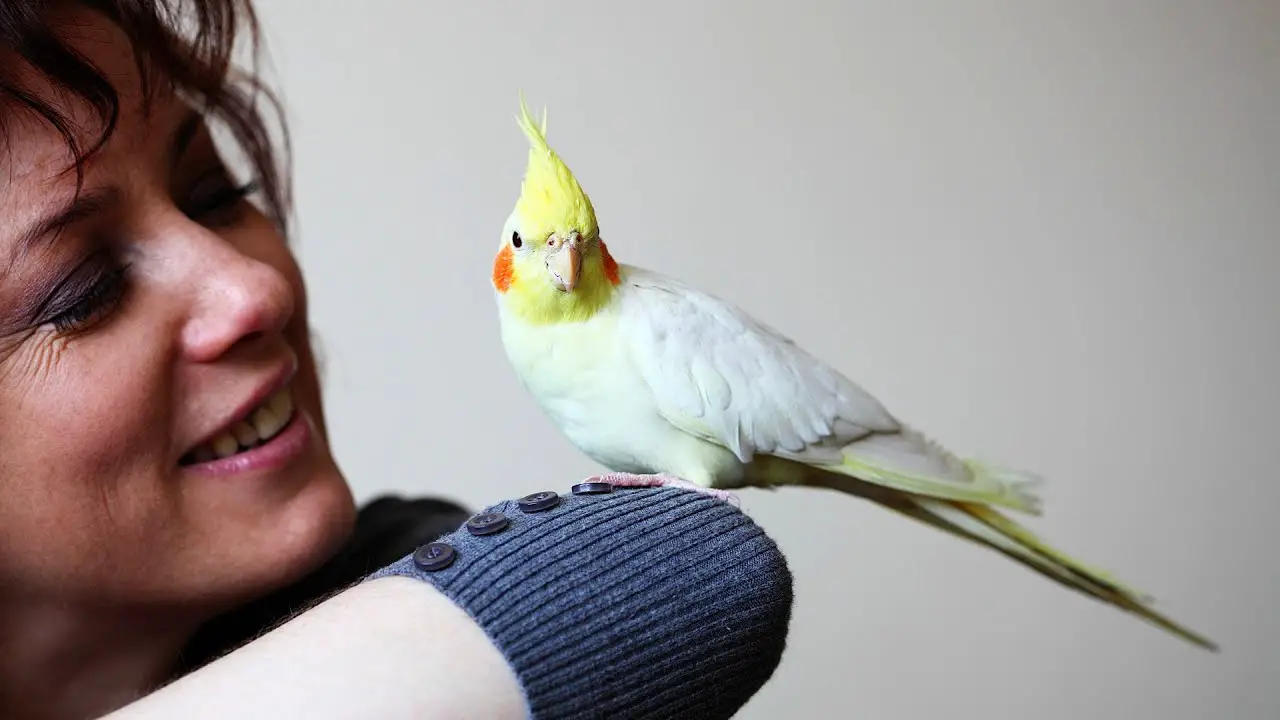
Losing a pet bird can be a deeply troubling experience. I understand how heart-wrenching it is to face the unexpected death of a feathered companion.
As someone who has cared for birds, I know that their health and happiness depend on a variety of factors. These factors include diet, environment, mental well-being, and preventive care.
When pet birds keep dying, it’s crucial to examine these elements closely and consider every possible cause.
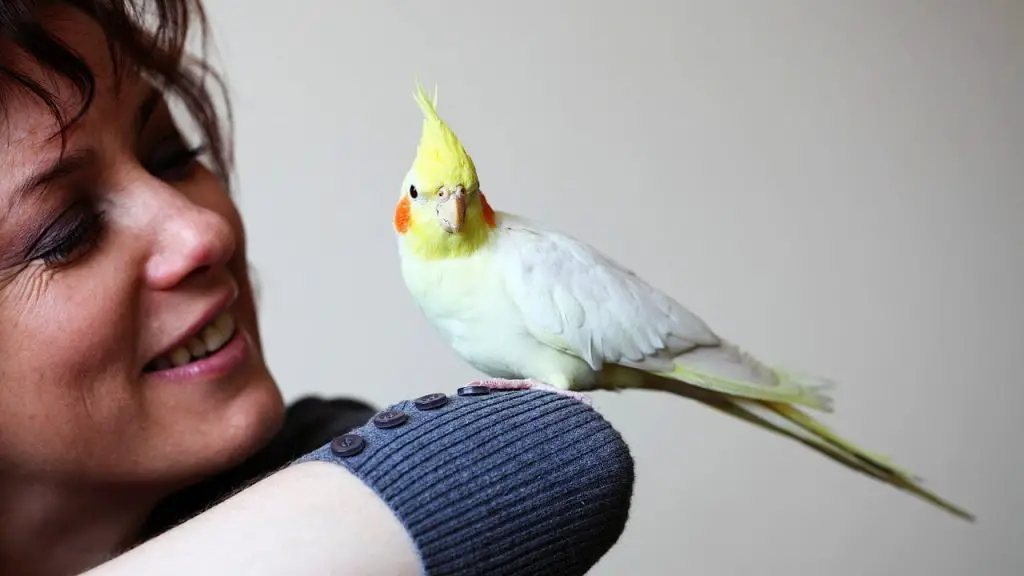
In my journey with pet birds, I’ve learned that their seemingly delicate nature requires a vigilant approach to their care. Recognizing the common signs of illness and addressing them promptly can make a significant difference in their survival.
Often, the causes of mortality in pet birds are rooted in deficiencies in their care, such as inadequate diet, exposure to toxic substances, or lack of mental stimulation, which can lead to harmful behaviors.
By taking a proactive stance, I’ve seen improvements in the vitality and longevity of my avian friends.
Key Takeaways
- Maintaining bird health requires diligent preventive care.
- Behavioral changes in birds can indicate underlying health issues.
- Understanding and adapting to a bird’s needs can prevent untimely deaths.
Understanding Bird Health and Diseases
Taking care of pet birds involves close attention to their health and behavior. Recognizing the signs of illness early and understanding common diseases can significantly enhance their chances of survival.
Let’s explore how to identify when a bird is sick, common ailments that may affect them, and the appropriate times to seek help from an avian vet.
Recognizing Illness in Birds
Recognizing illness in birds is crucial as they often hide symptoms of being unwell, a behavior rooted in their survival instinct.
As a bird owner, I watch for subtle changes that may indicate distress or disease. Key symptoms to be aware of include:
- Breathing: Difficulty breathing, such as labored or rapid breaths, can signify respiratory issues.
- Behavior: Shivering, shaking, or reduced activity might suggest the bird is experiencing distress.
- Feeding: A sudden decrease in appetite or weight loss could indicate an underlying health problem.
- Droppings: Changes in droppings, such as diarrhea, polyuria (excessive urination), or changes in the color of urates (the white part of bird droppings), are often early signs of illness.
- Feathers: Abnormal feather appearance or a condition like French molt can be symptomatic of disease.
- Physical Signs: Weakness, seizures, or sudden death, especially in young birds, might point to serious health concerns.
Common Diseases Affecting Birds
Birds are susceptible to a variety of diseases, which can sometimes be fatal without swift treatment. Some common yet serious conditions include:
- Psittacine Beak and Feather Disease (PBFD): This viral disease leads to feather loss and beak deformities.
- Avian Goiter: A thyroid problem that can cause changes in voice and difficulty breathing.
- French Molt: A viral infection resulting in loss of flight feathers in young birds.
- Proventricular Dilatation Disease (PDD): A condition characterized by weight loss, vomiting, and changes in droppings.
When to Seek Veterinary Help
As a seasoned bird owner, I know that birds are skilled at concealing their ailments, which means that by the time symptoms are noticeable, the disease may already be advanced.
I recommend contacting an avian vet if:
- There is a sudden change in my bird’s behavior or appearance.
- My bird shows any of the symptoms mentioned, even if they seem mild.
- If my bird has been exposed to other sick birds, as many avian diseases are contagious.
An avian veterinarian will have specialized knowledge in bird health, capable of offering accurate diagnoses and effective treatments that could save my pet’s life. Acting promptly ensures the best possible outcome for a sick bird.
Factors Influencing Bird Mortality
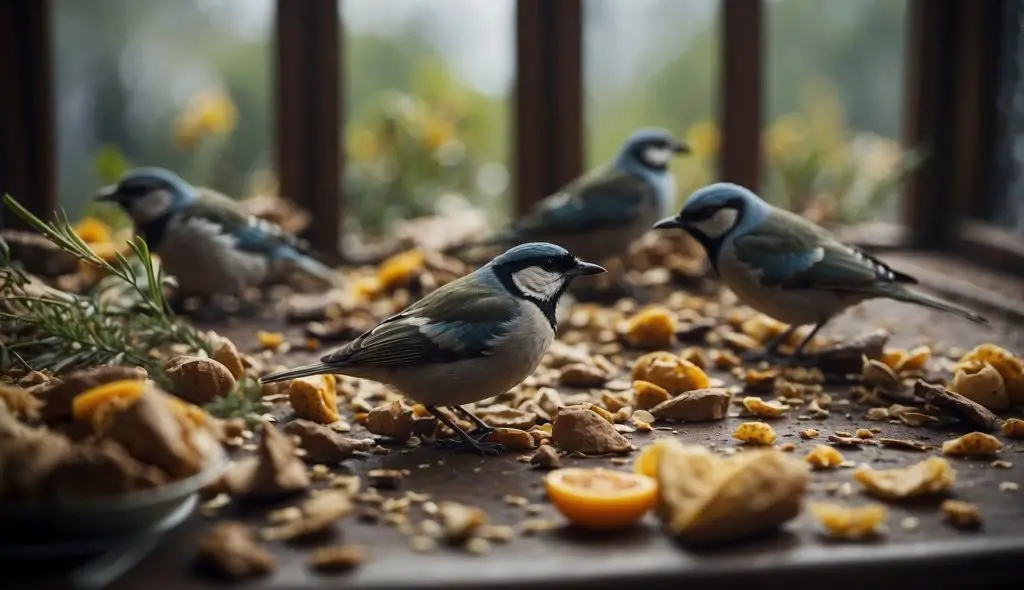
When I care for my pet birds, understanding the factors that lead to their mortality is crucial. From diet to environmental hazards, there are specific influencers that can impact their well-being.
Diet and Nutrition
A balanced diet is essential for my bird’s health. Cockatiels, for example, require nutrients that prevent lethargy and loss of appetite.
I ensure that harmful substances like chocolate, caffeine, and alcohol are kept far from their reach, as these can be toxic. A deficiency or excess of certain nutrients can lead to illness or even death. Here’s a brief list of diet-related concerns:
- Proper Nutrition: Ensuring a varied diet to meet all their needs.
- Toxic Foods: Avoiding chocolate, avocado, and caffeine which can be fatal.
Environmental Hazards and Toxins
My space needs to be safe for my birds, free from toxins like pesticides and fumes from non-stick cookware that can release harmful gasses.
Good hygiene practices are vital in preventing the spread of viruses. During hot weather, it’s important to watch for signs of panting or distress.
I keep wires covered to prevent accidents or trauma from chewing, and ensure proper ventilation, especially in the kitchen to avoid harmful fumes.
- Toxic Fumes: Teflon and other chemicals can be fatal when inhaled.
- Temperature Control: Regulating the environment to avoid overheating.
Predators and Accidents
Even indoors, my birds face threats from predators like cats or accidents from flying into windows.
I take steps to minimize these risks, such as using window decals and restricting other pets’ access to the birds’ space. Monitoring for any unusual behavior such as lethargy is key to preventing injury or fatality from unnoticed incidents.
- Predator Management: Keeping cats and other predators away.
- Accident Prevention: Ensuring a safe flying space to avoid collisions.
Behavioral and Psychological Aspects
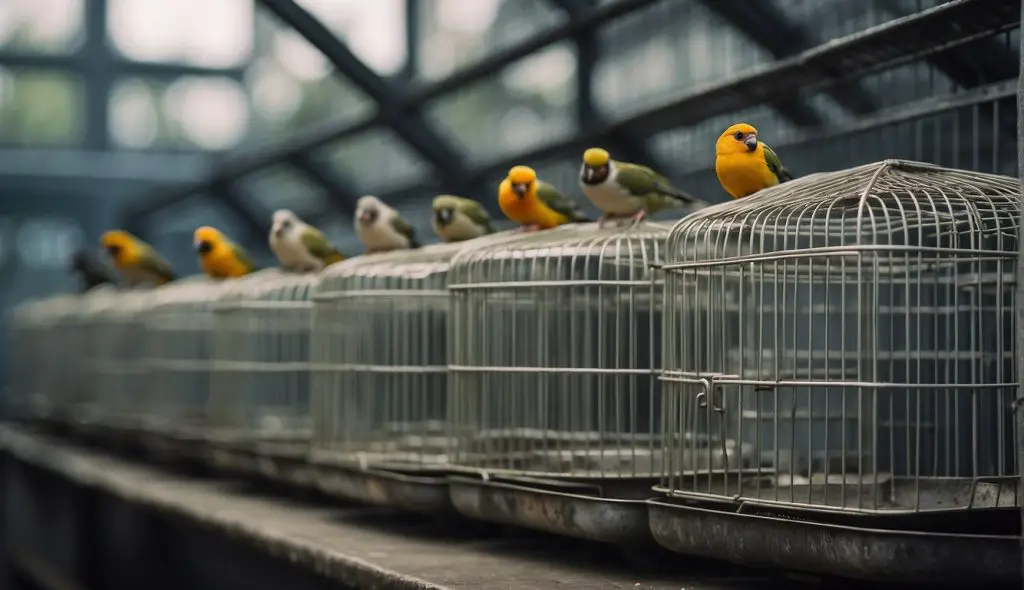
In caring for my pet birds, I’ve noticed that understanding their behavior and psychological state is crucial. These components play significant roles in their overall health and well-being.
Stress and Its Impact on Health
I’ve learned that stress is a powerful factor that can lead to health deterioration in birds. Factors such as environmental changes, poor husbandry, and loneliness can contribute to heightened stress levels.
Chronic stress can induce a state of immunosuppression, making my birds more susceptible to illness.
- Environmental changes: Sudden changes can disrupt their sense of security.
- Poor husbandry: Lacking care regarding cleanliness and diet may lead to stress.
- Social stress: Birds are social creatures; isolation can affect their mental health.
Signs of Psychological Distress
Recognizing signs of stress in my birds is pivotal to intervene early. Some indications of psychological distress include:
- Changes in vocalization
- Over-plucking feathers
- Changes in drinking habits
- Lethargy or aggression
- Behavioral changes like reduced preening or interaction
If my bird exhibits something like night fright, where it thrashes in its cage at night, it could point towards underlying stress or a psychological issue.
How to Manage Stress in Birds
Managing stress in birds involves a combination of proper care, environment, and understanding individual behaviors. Here’s what I focus on:
- Routine: Keeping a consistent schedule helps minimize stress.
- Enrichment: Toys, foraging, and training keep their mind stimulated.
- Social Interaction: Regular, gentle handling, or providing a companion can alleviate loneliness and stress.
Preventative Care and Husbandry
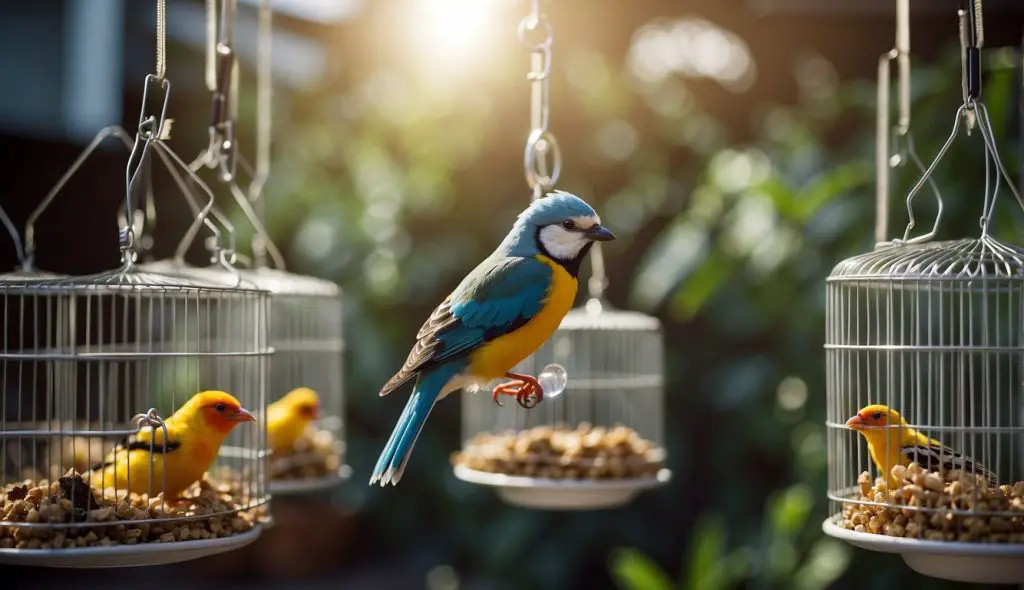
In ensuring the well-being of my pet birds, I’ve learned that a blend of meticulous husbandry, regular veterinary care, and an environment that promotes health is paramount. Let me share how these factors make a difference in keeping pet birds thriving.
Proper Avian Husbandry Practices
A cornerstone to maintaining my pet birds’ health is providing the optimal husbandry which includes a balanced diet and proper hygiene. I make sure to:
- Feed them a varied diet: It’s essential to offer a balanced mix of seeds, pellets, fruits, and vegetables. I avoid avian obesity and nutritional deficiencies by not over-relying on high-fat seeds.
- Maintain cleanliness: Their living space demands daily cleaning, with a focus on the bird feeders and water dishes to prevent the spread of diseases.
The Role of Regular Vet Check-Ups
Regular consultations with a specialized avian veterinarian allow me to catch any signs of illness early on:
- Scheduled health exams: I take my birds for annual check-ups. These include blood tests and fecal examinations to catch any hidden ailments.
- Emergency preparedness: Having a vet I can call immediately in case of an emergency ensures quick action for my birds’ health crises.
Creating a Safe and Healthy Environment
Creating a living space that minimizes stress and exposure to hazards has been vital for my birds. Here’s how I do it:
- Safety measures: I ensure their living space is free of toxic plants, fumes, and unsafe toys that could lead to injuries or health issues.
- Preventing exposure to wild birds: Direct or indirect contact with wild birds can transmit diseases. So, I keep my bird feeders clean and placed away from my pets’ living area.
Dealing with the Aftermath of Loss
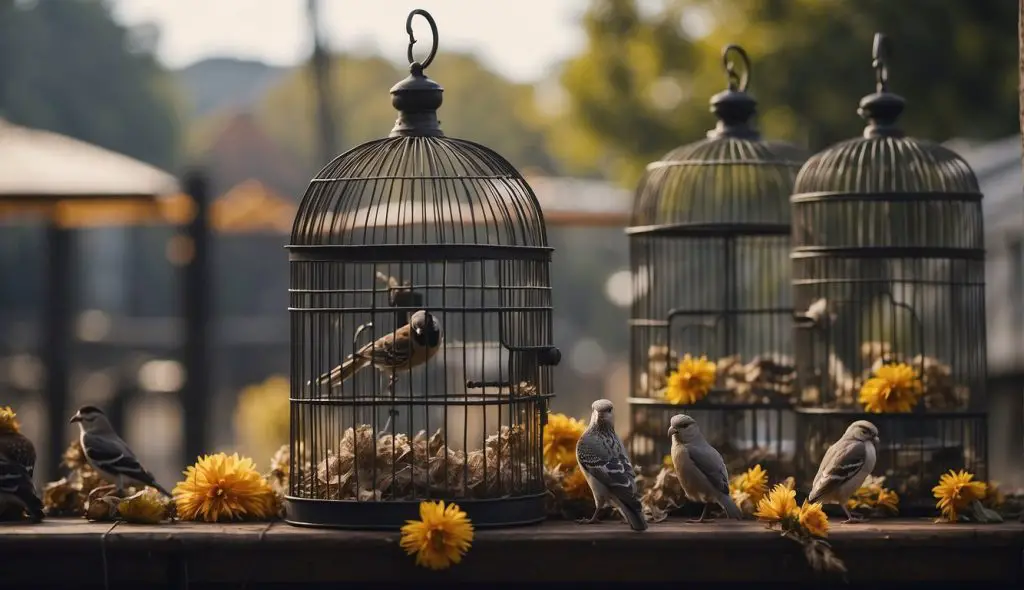
When my pet birds passed away, it was a challenging and emotional experience. I learned that focusing on the healing process is vital, from expressing grief to deciding on final arrangements.
Coping with Grief
I realized that grieving is a personal process and there’s no right way to navigate it. Talking about my feelings with friends or on platforms like Facebook helped tremendously. It allowed me to share memories of my pet birds and connect with others who have experienced similar losses.
Options for Burial and Cremation
I had to consider whether burial or cremation was the best choice for me. Burial can be done in a pet cemetery or at home, if local regulations permit. Cremation, on the other hand, offers a way to keep my pet’s ashes with me or to scatter them in a meaningful place. I weighed the options:
- Burial: Checking local ordinances for home burials; looking into pet cemeteries.
- Cremation: Researching pet crematoriums; deciding on communal or private cremation.
Finding Support
After the death of my pet, seeking support from those who understand pet loss was valuable. Here are some options I considered:
- Local support groups: Sharing experiences and coping strategies.
- Online forums and social media: Engaging with communities on platforms like Facebook for emotional support.
- Therapists or counselors specializing in pet loss: Receiving guidance through structured grief counseling.
Frequently Asked Questions
In my experience, understanding the health of pet birds is crucial to prevent sudden losses. I’ve gathered common questions and practical advice for bird owners to consider.
What are common symptoms to watch for in pet birds that indicate illness or distress?
Sudden changes in behavior, such as reduced singing or decreased activity levels, can indicate that my pet bird is unwell. Other symptoms include ruffled feathers, lack of appetite, difficulty breathing, or discharge from the eyes or nostrils.
What are the best practices for monitoring the health of my pet birds regularly?
I keep a close eye on my pet birds’ eating habits, droppings, and feather condition.
Additionally, I maintain a routine for vet visits. I also stay alert to any small changes in behavior or appearance. This helps me detect issues early.
How can I create a safe and healthy environment to reduce the risk of my pet birds dying?
I create a safe environment by using bird-safe cleaning products and placing the cage away from drafts and direct sunlight. I also ensure the cage is spacious enough, with appropriate toys and perches, to promote physical activity.
What should I do to help a bird that appears to be in distress?
If my bird is in distress, I remain calm and gently assess its condition without causing added stress. I remove any hazards from the environment and contact an avian vet immediately.
What are the signs that a pet bird may be dying?
Signs that a pet bird may be at the end of its life include labored breathing, weakness, lethargy, and remaining at the cage bottom. Birds may also exhibit a disinterest in eating and social interaction.
How can I prevent common causes of death in caged birds?
To prevent common causes of death in birds, I ensure a balanced diet, maintain a clean cage, provide mental stimulation, and avoid exposure to toxic fumes, non-stick cookware, and ceiling fans. Regular check-ups with a vet familiar with avian health are also beneficial.

